| Coach | NA |
| Venue | Stadion Kralj Petar Prvi |
RAD predictions
Predictions for RAD: See upcoming and historic predictions for RAD below.
Disclaimer: Past performance does not guarantee future results. Betting involves risk; only wager what you can afford to lose. Always gamble responsibly.
RAD latest results
| 26/05 | 4 - 0 | ||
| 20/05 | 1 - 1 | ||
| 13/05 | 2 - 3 | ||
| 06/05 | 3 - 0 |
RAD latest transfers
| Date | Player | From | To | Price |
|---|---|---|---|---|
| 2013-01-05 | G. Čaušić | RAD | Eskişehirspor | € 1M |
| 2012-08-31 | A. Pantić | RAD | FK Crvena Zvezda | € 425K |
| 2012-07-06 | F. Malbašić | RAD | 1899 Hoffenheim | € 1.2M |
| 2012-01-01 | G. Čaušić | FK Crvena Zvezda | RAD | € 29.5K |
| 2012-01-01 | L. Milivojević | RAD | FK Crvena Zvezda | € 450K |
| 2011-07-01 | Aleksandar Todorovski | RAD | Polonia Warszawa | € 400K |
| 2011-01-01 | N. Pejčinović | RAD | Nice | € 1M |
| 2009-08-01 | Jagoš Vuković | RAD | PSV Eindhoven | € 1.2M |
Prva Liga standings
| Rank | Team | MP | W | D | L | GF | GA | GD | Pts |
|---|---|---|---|---|---|---|---|---|---|
| 1 |
 OFK Beograd
OFK Beograd
|
28 | 18 | 4 | 6 | 52 | 24 | 28 | 58 |
| 2 |
 Tekstilac Odžaci
Tekstilac Odžaci
|
28 | 13 | 9 | 6 | 35 | 17 | 18 | 48 |
| 3 |
 Jedinstvo Ub
Jedinstvo Ub
|
28 | 13 | 7 | 8 | 34 | 29 | 5 | 46 |
| 4 |
 Semendrija 1924
Semendrija 1924
|
28 | 11 | 11 | 6 | 29 | 20 | 9 | 44 |
| 5 |
 Indjija
Indjija
|
28 | 13 | 5 | 10 | 31 | 24 | 7 | 44 |
| 6 |
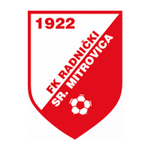 Radnički Sr. Mitrovica
Radnički Sr. Mitrovica
|
28 | 11 | 8 | 9 | 25 | 24 | 1 | 41 |
| 7 |
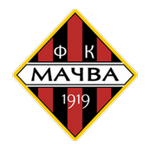 Macva
Macva
|
28 | 11 | 7 | 10 | 26 | 21 | 5 | 40 |
| 8 |
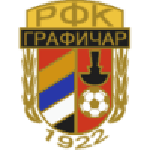 Grafičar
Grafičar
|
28 | 11 | 7 | 10 | 40 | 39 | 1 | 40 |
| 9 |
 Dubočica
Dubočica
|
28 | 9 | 11 | 8 | 25 | 28 | -3 | 38 |
| 10 |
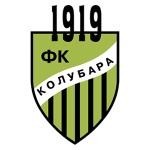 Kolubara
Kolubara
|
28 | 9 | 9 | 10 | 35 | 33 | 2 | 36 |
| 11 |
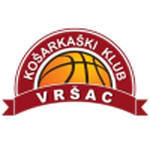 OFK Vršac
OFK Vršac
|
28 | 9 | 9 | 10 | 23 | 25 | -2 | 36 |
| 12 |
 Metalac GM
Metalac GM
|
28 | 8 | 10 | 10 | 21 | 28 | -7 | 34 |
| 13 |
 Sloboda Uzice
Sloboda Uzice
|
28 | 7 | 8 | 13 | 17 | 30 | -13 | 29 |
| 14 |
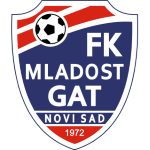 Mladost Novi Sad
Mladost Novi Sad
|
28 | 6 | 10 | 12 | 24 | 32 | -8 | 28 |
| 15 |
 RFK Novi Sad
RFK Novi Sad
|
28 | 6 | 4 | 18 | 23 | 44 | -21 | 22 |
| 16 |
 Radnički Novi Beograd
Radnički Novi Beograd
|
28 | 6 | 7 | 15 | 26 | 48 | -22 | 19 |
About RAD
Fudbalski Klub Rad, commonly known as FK Rad or simply Rad, is a professional football club based in Belgrade, Serbia. The club was established in 1958 and has since become an integral part of Serbia's football landscape. Rad, which translates to "work" or "labour" in Serbian, reflects the club's humble origins and its close ties with the construction company, RAD Belgrade.
The club's home ground is the King Petar I Stadium, also known as the Stadion FK Rad, located in the Banjica neighbourhood of Belgrade. The stadium, with a seating capacity of around 6,000, is known for its intimate atmosphere and passionate fans.
FK Rad's colours are blue and white, and their fans are known as the "United Force". Despite not being one of the most successful clubs in terms of trophies, FK Rad has a dedicated fan base and is known for its strong youth academy. The club has produced several notable players who have gone on to represent Serbia at the international level, including Ljubomir Fejsa, Nenad Milijaš, and Marko Grujić.
FK Rad's journey in the Yugoslav First League began in the 1982-83 season. The club's best performance in the top-tier league came in the 1988-89 season when they finished fourth. However, the club has mostly played in the Serbian SuperLiga since the dissolution of Yugoslavia. They have often found themselves in the middle or lower half of the table, occasionally facing relegation battles.
In terms of cup competitions, FK Rad reached the final of the Yugoslav Cup in 1989 but were defeated by Vojvodina. Despite the lack of major silverware, the club has had some memorable runs in the league and cup competitions, often proving to be a tough opponent for the more established teams.
FK Rad's reputation as a "feeder" club is well-known in Serbian football. Their focus on youth development has seen many players move on to bigger clubs in Serbia and across Europe. This model, while not always bringing immediate success on the pitch, has ensured the club's sustainability and continuity.
The club has faced several challenges over the years, including financial difficulties and issues related to the ownership. However, the resilience and dedication of the players, staff, and fans have seen FK Rad maintain its status as a professional football club.
FK Rad's history may not be filled with trophies and titles, but the club's contribution to Serbian football, particularly through youth development, is undeniable. The club's philosophy of nurturing young talent and promoting them to the first team has been a beacon for many aspiring footballers in Serbia. Despite the ups and downs, FK Rad continues to be a symbol of perseverance and dedication in the face of adversity.
In conclusion, FK Rad is more than just a football club; it is a testament to the power of community, hard work, and the love of football. The club's journey, filled with challenges and triumphs, reflects the spirit of its home city, Belgrade, and continues to inspire its loyal fan base.
















